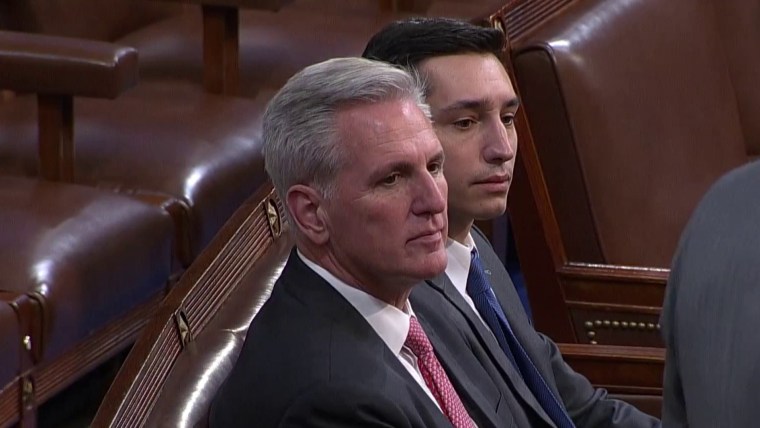UPDATE (Jan. 7, 2023 12:30 a.m. E.T.): This piece has been updated to reflect Republican Kevin McCarthy finally becoming House speaker early Saturday morning, after 14 failed ballots and a dramatic final round.
Kevin McCarthy should get used to this feeling. The California Republican spent Thursday living through his third day in a row failing to become House speaker on ballot after ballot. In between humiliations, he and his allies spent hours in closed-door discussion with the handful of far-right holdouts that have so far blocked his ascension.
As of Friday afternoon, when the House prepared for a history-making 12th vote, McCarthy still hadn’t found enough backing to get the majority he needed. In the process of trying to do so, he’s offered up enough concessions to fundamentally alter the power structure of the 118th Congress, managing to peel off several holdouts in the process. In doing so, he’s prepared to make himself a permanent hostage to the most extreme members of his party.
McCarthy has prepared to make himself a permanent hostage to the most extreme members of his party.
The list of demands from the bloc that has stood in McCarthy’s way is lengthy, but most have less to do with specific policy items than the way the House itself functions. Even before the first ballot was cast on Tuesday, the incoming GOP majority agreed to alter the House rules to block any bill that increased spending that budget year, establish subcommittees to investigate the origins of Covid and the “weaponization of the Federal Government,” and require that the Jan. 6 Committee’s documents be redirected from the National Archives to the House Administration Committee.
But the naysayers wanted more — and they seem likely to get it, to the detriment of the speakership broadly and McCarthy very, very specifically.
One of the proposed changes that has gotten the most attention would make it easier to oust a speaker. McCarthy had already agreed to lower the threshold for a “motion to vacate the chair” to just five members. Despite claiming that he wouldn’t budge on dropping that bar further, McCarthy has reportedly caved — now any single member will be able to put forward a resolution calling for his ouster.
Some of the demands from the holdouts that sound the most reasonable deal with the way the House passes bills. It’s been many, many years since the House actually managed to pass the 12 standalone appropriations bills that instead get wrapped up into a massive omnibus spending bill. McCarthy has now reportedly agreed that over the next two years each of those bills will get their own vote — and that amendments will be allowed from any lawmaker as those bills are debated on the House floor.

To understand why that’s such a big deal, we have to talk about one of the most consequential demands from the holdouts: more seats for far-right members on the House Rules Committee. Despite its extremely bland name, all major legislation that reaches the House floor for a vote flows through the Rules Committee. Because of how much the House has on its agenda, it relies on “special rules” to fast-track bills to the forefront, most often setting limits on how long the debate can last and how many amendments can be offered.
The Rules Committee has been an extension of the House speaker’s power for decades now, with the majority holding nine seats and the minority getting only four. The House Freedom Caucus — which has been a thorn in the side of multiple GOP leaders now — has been insisting that three of its members sit on the committee, enough to block any legislation if they join Democrats in voting against it. Based on NBC News’ reporting on Friday afternoon, McCarthy has agreed to give them those seats.
When taken together, it amounts to a significant reversal of years of power being accumulated in the hands of the speaker.
When taken together, it amounts to a significant reversal of years of power being accumulated in the hands of the speaker. That sounds good in theory, as does allowing members to offer up more amendments to bills, rather than just voting on the carefully crafted deals that party leadership hammers out. But trying to herd the House’s 435 members is a nightmare under ideal circumstances, as the last few days have shown us. The streamlined processes that McCarthy is tossing away have developed partly to ensure anything gets done at all — and the holdouts’ proposals would more likely create new chokepoints to kill bills rather than help pass them.
Moreover, the changes McCarthy has signed off on would make it all but impossible for him as speaker to cut the sort of deals that his predecessors have needed to get even the most basic functions of government done. The threat of what is basically a “no confidence” vote would constantly be looming over his head, with potential usurpers around every corner should he anger the Freedom Caucus. And the statements from his newly converted supporters have made sure to include an implicit threat that McCarthy would pay should he renege on his promises.
Part of the reason McCarthy is in this mess in the first place is because his slim majority means he either needs near total unity — which the House GOP clearly lacks — or the support of Democrats. But why would Democrats trust any offer he put forward in negotiations in the first place, knowing he would be risking a metaphorical beheading and most likely lack the votes to follow through on any promises?
The twelfth round of voting saw a substantial shift toward McCarthy, with 14 of the 20 or so holdouts that had stymied him flipping “pending negotiations,” as many of them caveated their votes. But the anti-Kevin camp has two factions, and McCarthy still needed to flip several of the remaining six Republicans stonewalling his bid after the 13th ballot.
Following that vote, the House adjourned until late Friday night, giving Republicans time to secure a final breakthrough. McCarthy will wind up speaker still, a prospect that seemed all but impossible just a day ago. But the tense negotiations that he’s suffered through this week will only find themselves repeating over and over again — and he’s running out of ransom to pay.

